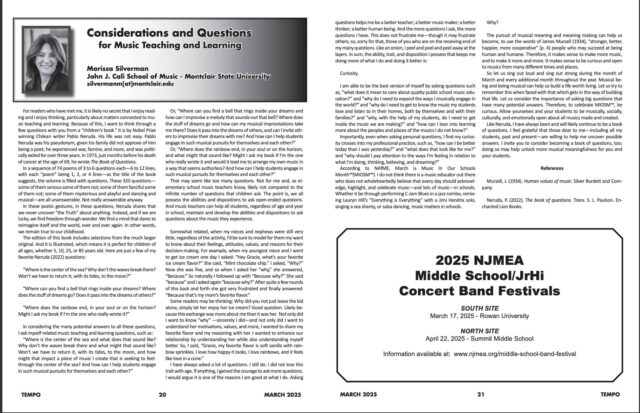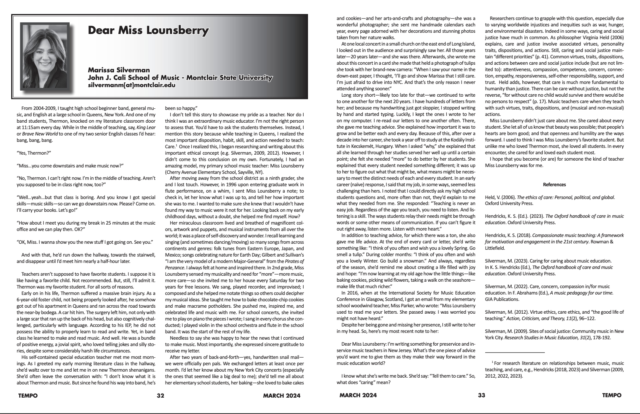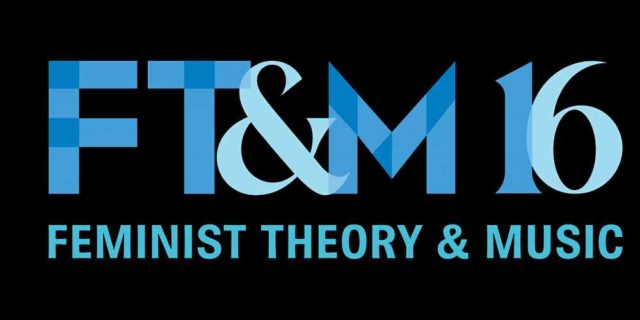According to NAfME, March is Music In Our Schools Month® (MIOSM®). Because of this, its seems fitting to share some considerations and questions for my own music teaching.

According to NAfME, March is Music In Our Schools Month® (MIOSM®). Because of this, its seems fitting to share some considerations and questions for my own music teaching.

According to NAfME, March is Music In Our Schools Month® (MIOSM®). Because of this, I find it fitting to share something about me, and how my public school music teacher mattered.

According to NAfME, March is Music In Our Schools Month® (MIOSM®). Because of this, let’s revisit some of the values of music. And know the values of music have become increasingly clear. Why now and how so?
During pandemic-based online classes last Fall, one of my graduate students announced: “I’m so grateful to have a job; but I hate teaching music online. I miss seeing my kids’ faces; I miss being with them; I miss making actual music in an actual room with one another.”
Another said: “Nothing, no online virtual choir, can take the place of feeling-through live music making together.”
Another said, in tears, “I’m trying so hard to be positive, but I found myself crying after teaching chorus online today… music is a human art. Not connecting with students through music makes me feel like a part of me is missing…”
Beyond hearing from teachers in NJ, I visited a kindergarten music class online this time last year. I won’t go into the entire class’s musical happenings. But at the very end of the class, one student refused to leave the class’s online “room.” The teacher said: “But class is over. It’s time for you to go to your next class.” The student said, “Yeah but I’ve created a song for you. Don’t you want to hear it?” How could the teacher not have allowed her to perform her song? So on the spot—it was quite clear she just didn’t want to leave, and did what she could to keep their time together going—this student proceeded to make up a “song” and sing, “Mr. Wallington, I love you, and I love music class, and I want to sing and sing and sing all day long…”
So, why were music teachers crying? Why was this kindergarten student doing everything in her power to stay in music class?
The real question is: Why does music matter related to one’s education? Or, stated differently, Why does music matter for one’s life? Here are 3 values. They aren’t the most comprehensive. Still, they’re potential values to all kinds of music making and sharing.
So, to celebrate MIOSM®, allow yourself to know and feel that music education matters. Our profession matters when things in the world seem to be going smoothly. However, our profession matters even more when things in the world seem to be difficult and challenging. Indeed, when we engage in the teaching and learning of music, we provide avenues and pathways that can help our students to understand themselves and one another.
Great music making and listening provide important reminders for why we need to “show up” for each other each and every day. Let’s harness this world’s uncertainty and remember what’s important: Being present for each other. And music making, listening, and sharing can help us get there; we just need to be open to its numerous benefits.
Suzanne Cusick, Susan McClary, and Lydia Goehr; to name only a few of my favorite feminist musicologists, theorists, and philosophers. Prior to the pandemic, I was thrilled when I’d suddenly find myself riding in an elevator with Cusick (though I was too shy to introduce myself); I was equally grateful to have given Goehr a ride back to her Columbia University apartment from my own institution; and, while I have not yet met McClary, I can likely quote from her brilliant book, Conventional Wisdom, as I’ve read and re-read it so many times. Needless to say when I saw the call for papers for the Feminist Theory and Music (FT&M) 2022 Conference, I was scared, excited, anxious, and filled with a “why not throw your hat in the ring” attitude. Because I’m not a trained musicologist, nor a theorist, I couldn’t have imagined they’d allow me to present. Long story short: They did!

According to the FT&M’s mission statement, “The study of music from the perspective of feminist theory raises significant questions that transcend the methodologies of any one subdiscipline of music. Feminist Theory and Music (FT&M) has met biennially since 1991 to provide an international, transdisciplinary forum for scholarly thought about music in relation to gender and sexuality, as well as for performances that present such thought in sound and embodied action.”
So, in addition to some amazing thinkers, movers, and shakers within music history, music theory, performance practice, gender studies, philosophy, jazz studies, and cultural anthropology, while at the 30th Anniversary of the Feminist Theory & Music Conference at the University of Guelph (Ontario, Canada), I met musicologist, pianist, and educator Anneli Loepp Thiessen. And I feel privileged to have heard her paper, “B is for Beyoncé: Picture Books as a Tool for Intersectional Music Education.”
As described via the conference website:
Feminist education invites students to investigate their own intersecting identities, and opens conversations around the systems of oppression that have led to women’s erasure from various spheres of society (Vickery and Rodriguez, 2021). For elementary music instructors, feminist education mandates a robust acknowledgement of the diverse contributions of women in music. In what Hess (2015) identifies as a “ground up” approach, this content should not be limited by era, genre, race, or ability and rather should encompass women’s contributions to many facets of music. Bound by male-dominated syllabi, an outdated classical/popular hierarchy, and colonial limitations of merit (Ewell, 2020), many instructors struggle to begin this crucial task.
This presentation demonstrates that picture books are a powerful tool for elementary music lessons by highlighting women’s diverse identities and musical experiences in an immersive way. Tough topics such as racism, homophobia, and sexism are made accessible through stories that invite readers to identify their own positionality and imagine a new future (Swartz, 2020). Visual and literary aids provide a resource that captures the nuances of women’s experiences, beyond what a traditional lesson can offer. Books on figures like Ella Fitzgerald (Kirkfield, 2020), Celia Cruz (Chambers, 2007), and Miriam Makeba (Erskine, 2017) compel students to consider the impacts of racial injustice, industry discrimination, and political turmoil on women’s experiences of music making. This presentation will outline how music picture books can be an effective tool for decolonizing education, promoting equality in music making, and illuminating the profound contributions of women in music.
Her children’s book, The ABCs of Women in Music—with gorgeous illustrations by Haeon Grace Kang—is a treasure trove of great female music makers/generators/thinkers. And each page is filled with endless possibilities for music educators to teach nearly each and every aspect of music. Especially ripe for elementary general music teachers—nay, any music educator—all one needs is a little imagination to help catapult a variety of classroom music lesson plans, classroom creativity, classroom publishing, and more.
Meet Clara the composer, Ella the jazz singer, Selena the pop star, and Xian the conductor!
Women in music are brilliant, creative, brave, and resilient. They are composers, conductors, singers, musicologists, electronic music producers, and so much more … [M]eet 26 remarkable women musicians who collectively span over 1,000 years of music history and represent a diversity of cultures, races, professions, and abilities. Their incredible stories and beautiful work are sure to inspire a new generation of musicians!
I cannot recommend this book enough.
It’s Teacher Appreciation Week! And our teachers deserve our sincerest gratitude!
I can’t speak for all teachers, and won’t try. However personally, this was a difficult and challenging year. And while I never (NEVER) again want to be forced to teach via zoom, and am grateful for every in-person interaction I’ve had with students—especially those that forced me to challenge the what, why, and how of my own teaching—damn, this year was a lot.
So, to remain balanced and not be too harsh on myself, I have been taking solace in my students themselves, in their uniqueness, in all the ways they teach me about all kinds of educational and musical matters.
At the start of every semester in all my undergraduate classes, I survey the students about their musical identities. It’s a way for me to learn a little about them, but also to learn a lot about musics I don’t likely know.
So, at the start of Teacher Appreciation Week, and from me to you, here’s what my students taught me about being in the world through music. The result is a playlist of what they and I consider our pasts, presents, and futures. This particular class is not large (which is why I’m sharing this playlist with you over another class’s musical identities). And I will not tag them nor name them (as that would not be cool). But if your identity is featured here, you know who you are.
This Teacher Appreciation Week I’d like to thank all the teachers! Especially my students. For me, you’re my greatest teachers.
According to NAfME, March is Music In Our Schools Month® (MIOSM®). I don’t think there is a music educator out there who doesn’t wholeheartedly believe that each and every day should acknowledge, highlight, and celebrate music—and lots of music—in schools. Whether it be through improvising over the chord changes to “C Jam Blues” in a jazz combo, remixing Lauryn Hill’s “Everything is everything” with a Jimi Hendrix solo, singing a sea shanty, or salsa dancing, music teaching and learning matters in schools. Why?
Because the pursuit of musical meaning and meaning making can help us become—to use the words of James Mursell— “stronger, better, happier, more cooperative” people who may succeed at being human and humane. Therefore it makes sense to make more music, and to make it more and more.
So let us sing out loud and sing out strong during the month of March and every month throughout the year! Musical being and being musical can help us build a life worth living. Let’s try to remember this when faced with that which gets in the way of building that life.
We teach music in schools so students will experience personal, artistic, social, empathetic, and ethical growth and fulfillment; health and well-being for oneself and others; self-efficacy and self-esteem; happiness for oneself and others; and a means of engaging positively with the community and the world. In fact, to celebrate MIOSM® let’s promise to find ways that we—ourselves and our students—can experience joy of many kinds in school through music.
Music education matters. Our profession matters when things in the world seem to be going smoothly. However, our profession matters even more when things in the world seem to be difficult and challenging. How so? When we engage in the educative teaching and learning of music, we provide avenues and pathways that can help us understand ourselves and each other.
Great music teachers provide important reminders for why we need to “show up” for each other each and every day. For the remainder of the school year, let’s harness the uncertainty as best as we can and remember what’s most important: Being present for each other through music.
Music education matters. We cannot say it more plainly than this. And Music Matters (2nd edition) gives amble evidence for why this is the case.
The profession matters when things in the world seem to be going smoothly. However, the profession matters even more when things in the world seem to be difficult and challenging. Why? Because when we engage in the teaching and learning of music, we provide avenues and pathways that can help us understand ourselves and each other.
These below highlighted GRAMMY award-winning music educators know the above to be true. And they provide important reminders for why we need to “show up” for each other each and every day.
Regardless of how many years you’ve been a music educator–1 year, 15 years, or 30 years–we are ALL first-year teachers again this school year. Let us harness this uncertainty and remember what’s most important: Being present for each other through music making.
Given the current state of the world, Mother’s Day this year feels very different. For the most obvious reason: We are physically separated. Still, this actual distance does not necessarily mean distant. So, let’s celebrate moms; especially those beyond our reach.